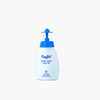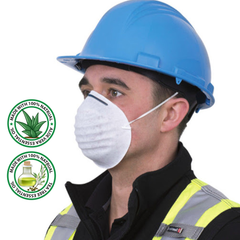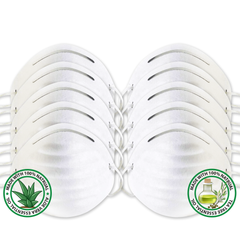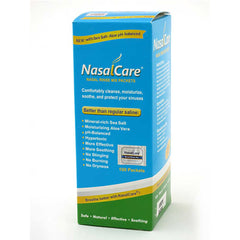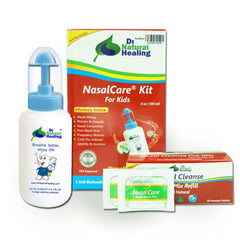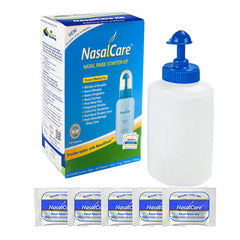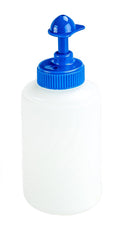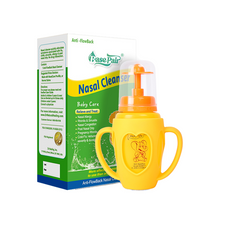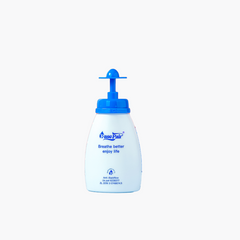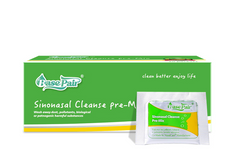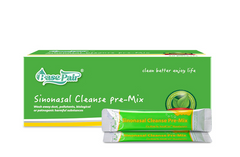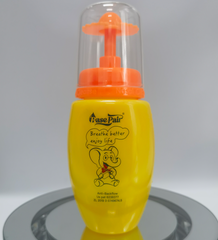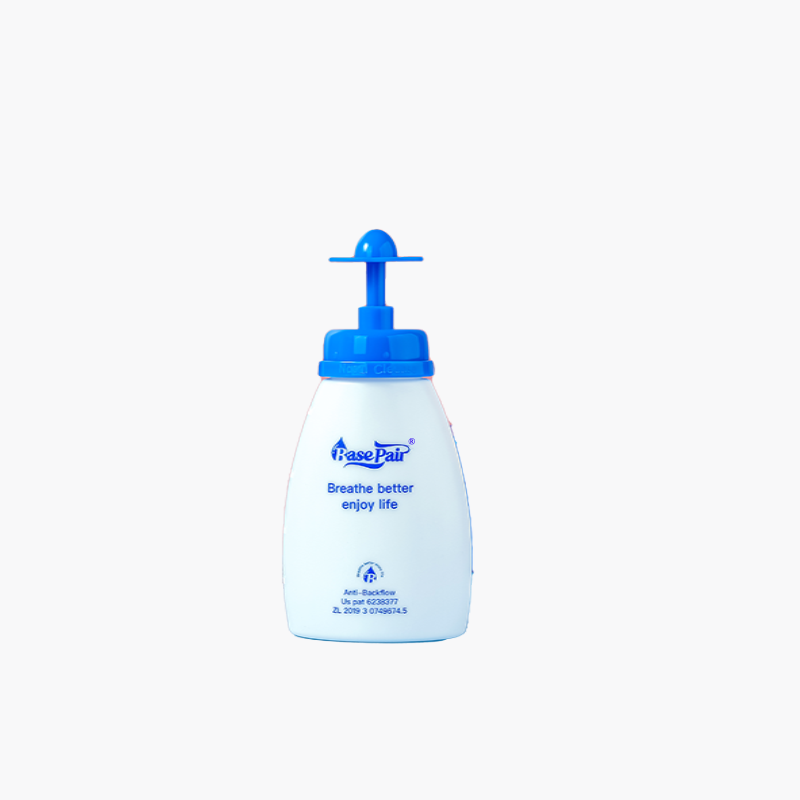
Adult's Nasal Irrigator
Available
FREE SHIPPING ON ORDERS OVER $50!
Our Award Winning NasalCare!
Scientifically proven to help wash away 100,000 viruses from your nasal cavity if you have a virus in your nose! Based on sampling with 3cc used to detect 100,000 viruses. We use a 240cc solution to wash away as many viruses we can!

Used by Customers All Over the World for Respiratory Relief!
Patented Dual Valve Anti-backflow Technology for non-contaminating complete and effective 4-Way Upper Airway Cleanse
|
Effective, Safe and Easy Nasal Irrigation System Your Upper Respiratory Tract.
|
INSTRUCTIONS:
- Dissolve the contents of one packet in 6 oz (240 ml) of lukewarm, distilled water in the nasal irrigator bottle.
- Cleanse the nose as instructed in any of the Nasal Cleanse, Cold Virus Remover, Allergen Remover or Cold Flu Care Kits
Store at room temperature in a dry place.
Q1: What Is Nasal Irrigation?
A: Nasal irrigation, or called nasal lavage, sinus rinse, nasal wash, or nasal rinse, is a personal hygiene as well as a therapeutic practice in which the nasal cavity is washed with a solution to flush out excess mucus, pathogens, inflammatory factors and debris from the nose and sinuses. It has been practiced in Asia for centuries as one of the disciplines of yoga. Modern clinical studies have demonstrated that nasal irrigation is a simple, safe and effective alternative preventive and therapeutic modality for many common acute or chronic nasal sinus illnesses. Many medical professional societies have endorsed or recommended nasal irrigation for reducing some common nasal or sinus problems.
Q2: How Do I Perform Nasal Irrigation?
A: The following link is to a video that demonstrates how to use All-NasalCare to perform nasal irrigation for the treatment of the cold & flu, allergies, sinusitis or nasal congestion. All-NasalCare’s nasal irrigation system is an all-natural, simple, and easy sinus and allergy treatment that brings gentle and soothing sinus relief. Please use sterilized, distilled or pre-boiled water — not tap water — to prepare the irrigation solution. Click the following link for a the video on how to perform nasal irrigation.
Q3: How Does Nasal Irrigation Work?
A: Nasal irrigation reduces many common upper respiratory illnesses through the following several mechanisms independently, simultaneously or jointly: Mechanically washing out pathogenic microorganisms from nasal and or sinus cavities. Mechanically washing out harmful pollens, dusts, and any other environmental pollutants from nasal and or sinus cavities. Loosening, softening and washing out built up mucus secretion and/or pus from nasal and or sinus cavities. Diluting, reducing and removing inflammatory mediators in the nasal and or nasal cavities.
Promoting to forming a thin protective liquid film over nasal and sinus membrane and therefore reducing pathogen contact with nasal and sinus membrane. Restoring, promoting or activating ciliary function and therefore strengthening Nasal and sinus self-cleansing and protecting mechanisms. Promoting/restoring normal biological microenvironment in the nasal and sinus cavities and therefore promoting self healing, while reducing pathogenic microorganism growth in the nasal and sinus cavities. Non-surgically removing blockages in nasal passage to make you breathe easier. Reducing bad secretions sticking on your throat, so you feel better.
Q4: Do All Nasal Irrigation Products Work Equally Effectively?
A: No. Not all products are created equal with some products better than others. The nasal irrigation system consists of two parts: the irrigator, and the rinse mix. The quality and the design of the irrigator, and the formulation of the rinse mix can significantly influence the effectiveness of the product. Some nasal irrigators in the market are poorly designed or poorly manufactured. The most serious design defect of some common nasal irrigators in the market is backflow. Backflow means that dirty washing solution re-enters into the nasal irrigator because of the negative pressure inside the irrigator. Because liquid in the nasal cavity may contain bacteria, fungi, or viruses, if such liquid enters into the irrigator, the irrigator and the remaining solution in the irrigator could become contaminated, hence, re-infection of nasal cavity and or sinus cavities may occur.
Therefore, backflow may pose a potentially serious health risk to the user. All rinse mixes contain salt, either table salt or sea salt. Table salt is much cheaper than sea salt, but it is also not as good as sea salt. Because sea salts are rich in other health beneficial minerals or trace elements besides sodium, it is better for mucus membranes and cilia, and it may also have indirect anti-bacterial, anti- fungal, anti- viral and anti- inflammatory effects. Therefore, rinse mix with sea salt is superior to those with regular salt. In addition, aloe vera is very useful in maintaining nasal moisture, the citric buffer is to balance the pH and enhances sense of smell. Better ingredients, better results.
Q5: For What Medical Conditions Is Nasal Irrigation Useful?
A: Nasal irrigation can be used alone or in combination with other conventional treatment methods to reduce the frequency of many common upper respiratory illnesses including but not limited to: allergic rhinitis acute and or chronic sinusitis acute and or chronic rhinitis common cold and flu post nasal drip post nasal/sinus surgeries pregnant rhinitis post nasal/sinus radiation therapy sjogren’s syndrome with dry nose
Q6: Can Nasal Rinses Prevent Or Reduce A Head Cold And/Or Flu Symptoms?
A: Nasal irrigation, at any stage of a head cold and/or flu, may reduce the severity and duration of symptoms of the sinus and nasal infection. Additionally, nasal irrigation during a cold or flu may reduce transmission of the disease to others around as it may reduce the concentration of the viruses in the aerosol generated by cough or sneezing and released into the air.
Q7: Is Nasal Irrigation Also Beneficial For A Normal Person Without Nasal Or Sinus Illness?
A: Yes, nasal irrigation is also beneficial for a normal person without sinus or nasal illness. Simply, your air filter (nose) needs to be refreshed each day. Like brushing teeth, nasal irrigation can reduce the chance of nasal and or sinus illness by removing or eliminating the pathogens in the nasal and or sinus cavities before they cause any illnesses. In addition, nasal irrigation may reduce or eliminate bad breath.
Q8: Can Nasal Rinses Reduce Or Cure Snoring?
A: In some cases, nasal rinses have reduced the symptoms of snoring. Why? Removing blockage of the airway can help to reduce snoring. Many spouses or roommates become happier after the heavy snorers use NasalCare products.
Q9: Does Nasal Irrigation Improve The Sense Of Smell?
A: It is well known that chronic rhinitis or chronic sinus disease will affect the sense of smell and taste. Rinsing with NasalCare Nasal Irrigator may reduce the symptoms of chronic nasal and sinus diseases which in turn improve the sense of smell and taste. Citric acid and sodium citrate used in NasalCare Rinse pre-mix have been clinically observed to enhance the sense of smell.
Q10: Will I Sense Burning When I Rinse My Nose?
A: You may sense burning if you use pure water or other inappropriate solution. You should not sense any burning or stinging if you use our patented NasalCare nasal rinse mix following our direction. Simply, it is slightly hypertonic, just about right to your nasal lining.
Q11: When Is The Best Time To Rinse My Nose?
A: The best time to rinse your nose is when you feel you were exposed to pathogens, especially if you came closely in contact with someone with cough or sneezing. For daily hygiene purposes, nasal rinses can be done at any time of the day. Generally speaking, it is convenient to rinse your nose in the evening when there is no time pressure and you can keep your nose clean for the whole night before you need to go outdoor and expose to dirty air again.
Q12: How Often Should The Nasal Irrigation Be Performed?
A:Whenever you think you have exposed to the pathogens. For nose hygiene purposes, 2-3 times per week should be fine.
Q13: Can I Share My Nasal Irrigator With My Family Member?
A: No. Due to the possibility of transmitting infection to each other, it is not recommended to share your NasalCare Nasal Irrigator.
Q14: What Are The Advantages Of NasalCare Nasal Irrigation System?
A: NasalCare nasal irrigation system has many significant advantages over the other squeeze bottles in the market, but the most and foremost significant of all are 1) two-valve and anti-backwash irrigator and 2) use of health beneficial mineral rich sea salt, aloe and citric buffer system. Unlike other similar products, NasalCare nasal irrigator contains a pair of one-way valves, a liquid valve and an air valve, and the two valves working together prevents any liquid returning into the irrigator after each squeeze. Backflow may pose a potentially serious health risk for the users as it can cause contamination and re-infection. Sea salt contains many other health beneficial minerals or trace elements besides sodium, sea salt is better for mucus membranes and cilia, with aloe and citric buffering system, the solution may also have indirect anti-bacterial fungal, viral and inflammatory effects. Therefore, NasalCare nasal rinse mix is better for the nasal and sinus membranes and is more effective against bacteria, fungi, viruses and inflammation.
Q15: Is NasalCare Nasal Irrigation System Safe For Pregnant Women?
A: Yes. Our NasalCare Nasal irrigation System (both the device and the solution) is safe for pregnant women and does not have any known interaction with other drugs. As a matter of fact, one of the benefits the product offer is to relief symptoms of pregnancy rhinitis naturally, whereas traditional treatments cannot. The symptoms of pregnancy rhinitis include persistent coughing, sneezing, nasal itching and congestion, runny nose, and sometimes headache. Many women (about 20-30%) experience symptoms of nasal congestion, coughing, and sneezing during pregnancy. Pregnancy rhinitis can really impact the life quality of mother-to-be. It makes it difficult for pregnant women to sleep well, breath comfortably, and perform their day-to-day functions. After using NasalCare, virtually all feel better.
Q16: Can Children Use NasalCare Nasal Irrigation System?
A: NasalCare is safe for children over 5 years of age. It is not recommended for children younger than 5, unless otherwise directed by a physician.
Q17: How Can I Clean My NasalCare Nasal Irrigator?
A: It’s easy. NasalCare Irrigator is generally without backflow caused contamination, you can simply rinse the bottle with soap water after each use. If for post-nasal surgery care, you can rinse and run through 60% alcohol to be safe.
Q18: Should Workers Exposed To Occupational Dust Perform Nasal Rinses?
A: Yes. Fire fighters and workers who are exposed to a large amount of environmental or occupational dust from construction work, farming, mining or various indoor and outdoor occupations may benefit by regular use of the nasal rinse procedure. You should rinse the nose as soon as possible after the exposure. The sooner the irritant is removed from the delicate nose membranes, the less likely the membranes are to get inflamed and congested.
Q19: What Is The Difference Between Saline Solution And NasalCare Nasal Rinse Mix?
A: NasalCare Nasal Rinse Mix contains sea salt, along with sodium bicarbonate, citric acid, sodium citrate, and aloe vera extracts. The solution made with our rinse mix is comfortable, and may enhance your sense of smell. The premium packets are easy and convenient to prepare 8 oz (240 ml) rinse solution. Using our premium pre- mix to rinse your nose, you will feel soothing and breathing easily.
Q20: Can Children Use NasalCare Nasal Rinse System?
A: Yes, as long as he or she is over 5 years and can follow the directions. Our NasalCare device is so user-friendly. Nasal irrigation using our NasalCare kit is as simple as brushing your teeth. The mix to make the nasal rinse solution is all natural and safe unless you are allergic to sea salt or Aloe.
Q21: What Is A Sinus?
A: A sinus is a hollow space within the bones of the face. The sinuses are lined by delicate membrane, or mucosa. There are four pairs of sinuses with functions of protecting the lungs by filtering, humidifying and warming the air inhaled, adding to the sense of smell and the quality of human sound.
Q22: How Many People Suffer From Allergic Rhinitis And Sinusitis?
A: Allergic rhinitis is an inflammation of the nasal passages, usually associated with watery nasal discharge and itching of the nose and eyes. Allergic rhinitis affects about 20 percent of the American population and ranks as one of the most common illnesses in the U.S. The symptoms occur in the nose and eyes and usually occur after exposure to dust, danders, or certain seasonal pollens in people that are allergic to these substances. The best treatment for allergic rhinitis is avoidance of the allergen or minimization of contact with it. Rinsing the noses with NasalCare Nasal Irrigator frequently can help reduce the accumulation of the allergens inside the nose. Therefore, it can reduce the occurrences of allergic rhinitis or the symptoms.
Q23: What Is Rhinitis? What Is Sinusitis?
A: Rhinitis is an inflammation of the mucosa of nasal passages. Sinusitis is an inflammation of the mucosa of various sinuses, which are located around the nasal passages. Usual symptoms include increased nasal secretions and pain or headache around the sinuses. Because Rhinitis and Sinusitis often occur together and is difficult to diagnose separately, physicians use a new term of rhinusitis to describe the disease.
Q24: What May Cause Rhinitis And Sinusitis?
A: cold or flu viruses, allergens, bacteria, fungi, chemical vapor and cigarette smoke, various dusts, grass and smog, nasal polyps and deviated nasal septum.
Q25: What Are Antihistamines?
A: Antihistamines are the most common medications used to treat allergies. They work by blocking the effects of histamine which is released during an allergic reaction and help relieve the symptoms of sneezing, itchy nose and eyes and runny nose. They are not as helpful with nasal congestion.
Q26: What Is An Allergen? Can You Name A Few Allergens?
A: Allergens are materials, which, after accumulating to the nasal mucosa or respiratory mucosa, cause overreaction of body’s immune system and lead to allergic symptoms. The most common allergen is tree or grass pollens. Outdoor allergens include grass and mold. Indoor allergens include dust mites, molds, pet dander and cockroach related particles. Other substances such as paint vapor, fiber dust, cigarette smoke, perfumes and aerosol sprays can also cause allergic reaction. Q: What Is A Mold? A: Mold is a fungus. It usually grow in damp and warm places, such as basements, bathrooms, kitchens, water damaged areas such as wood or carpets, water coolers, heater fans, etc.
Q27: What Is Pet Dander?
A: Pet dander is the small particles from skin of animals and birds. Any pet with hair or feathers will shed dander. Dander is a very common cause of indoor allergies at home or in animal farms.
Q28: What Is Seasonal Allergic Rhinitis?
A: Allergy symptoms occur at certain seasons such as Spring or Autumn are commonly called hay fever or seasonal allergic rhinitis. These symptoms are commonly caused by pollens, grass and molds. Q: What Is The Relationship Between Rhinitis/Sinusitis And Asthma? A: Physicians found that frequent rhinitis and chronic sinusitis can lead to asthma. Curing or reducing rhinitis/sinusitis may improve the symptoms of asthma significantly. Approximately 80% of the patients suffering from allergic asthma do have coexisting allergic rhinitis.
Q29: Is Your NasalCare Nasal Rinse System The Same As Saline Nasal Spray?
A: No. Our NasalCare Nasal Rinse Kit is very different from saline nasal sprays. Ours provides much more volume (240 ml or 8 oz) than nasal sprays (a few drops, or less than 5 ml if you use the entire bottle at one time). NasalCare Nasal Rinse System can clean your nose and remove pathogens from your nose while the spray only moistens your nose. If you are still skeptical of nasal irrigation please read on.. (ARA) – Sinus problems typically drive many of the 70 million American sufferers to drug-based commercial remedies like psuedoephedrine pills or chemical nasal sprays. But a new study, published in the medical journal Otolaryngology – Head and Neck Surgery, shows that the simplest approach might be the best – regular nasal washing with warm water and 2 percent saline. Researchers found that the all-natural treatment not only clears up sinus symptoms associated with cold and flu, allergies and sinusitis on a long-term basis, it is proven to improve overall quality of life in patients with sinus symptoms. The findings could point to an effective sinus remedy for Americans who experience annoying or painful symptoms – brought on by common cold, allergies and air pollutants – but who have grown leery of antibiotics and other drug-based commercial products. A consumer survey conducted last year by Impulse Research found that 82 percent of sinus sufferers said that over-the-counter drugs they have tried do not provide long-term relief. The solution, according to the new study, is in regularly cleaning the nose with a simple method based on the ancient yoga nasal washing pot. “The nose is a complex thing that, by design, collects pollutants to prevent them from entering the body,” said Dr. Diane G. Heatley, a Madison, Wisc., otolaryngologist. “But the nose itself needs to be cleaned regularly or sinus symptoms will develop. This new study shows nasal washing with a neti pot to be an effective treatment for the root causes of sinus problems.” The study is the first to follow participants using nasal wash treatment, or hypertonic saline nasal irrigation (HNSI), over a long period of time. Three primary outcome measures, including Sino-Nasal Outcomes Test (SNOT-20), all showed significant improvement over the 18-month trial. Secondary outcome measures including frequency and pattern of HSNI use, side effects and satisfaction showed that participants reported improved quality of life and frequent, satisfying use of nasal washing. The 2-percent nasal wash solution was self-administered by participants through a SinuCleanse neti-pot. Results of the study showed decreased sinus symptoms, overall improved health and, particularly intriguing according to the authors, a decreased use of sinus medication among nasal wash users. The study’s lead author, Dr. David Rabago of the Department of Family Medicine, University of Wisconsin Medical School-Madison, concluded, “The study strengthens the argument that HSNI is a safe, well-tolerated, inexpensive, effective, long term therapy that patients with chronic sinonasal complaints can and will use at home with minimal training and follow-up.” The research results (“The Efficacy of Hypertonic Saline Nasal Irrigation for Chronic Sinonasal Symptoms”) can be found at the Otolaryngology – Head and Neck Surgery Web site: http://www.academicjournals.org/articlearticle1379601945_Ao%20et%20al.pdf These results add to initial studies that were done by the University of Wisconsin supporting nasal washing as a successful way to treat sinus problems over a short period of time. “This study provides further scientific data to support nasal washing as a safe, effective and satisfying method for relieving and preventing sinus problems,” said Dr. Heatley. “Chronic sinus problems will not go away on their own. Like weight control, sinus problems must be managed over time.” Dr. Heatley has been recommending nasal washing to patients of her ear, nose and throat practice for more than 10 years. According to Heatley, nasal washing is safe for everyone, including children and pregnant women, because it is drug-free. And, because it is natural, there is no risk of drug interactions. The process treats the root of nasal problems using a saline rinse to remove thickened, bacteria-laden mucus from the sinus cavities. This soothes nasal passages rather than just masking the symptoms. Courtesy of ARA Content. Q: What Is The Science Behind NasalCare? Our first design was a squeeze bottle without anti-backwash valves, similar to others on the market. Yes, it was better than neti pots, but after squeezed, the bottle became negatively pressured and sucked the nasal wash solution back into the bottle and narrow, hard-to-clean tube. We quickly recognized the risk of re-infection, and we also knew that time-consuming bottle-wash after each use would not be practical if users need to frequently rinse their noses. If patients did not wash the contaminated tube and bottle well, there would be a high risk of sinus re-infection even though their doctors had performed excellent nasal surgeries. This was proved late by Dr. Amin Javer’s group from St. Paul’s Hospital, Vancouver, Canada, who orally presented their clinical studies on the first day of the Rhinology World 2009 conference in Philadelphia (Abstract #1356 on page 47 of the Program). Hindered by negative pressure crushing the bottle, and too soft a bottle, the cleansing efficiency of the backflow-prone bottle-obviously needs a significant improvement. To prevent the problematic backflow, we invented a nasal irrigator with both liquid and air valves. We filed the patent on Jan 17, 1997 and it was granted in 2000. We filed 510K application to FDA and received clearance in 2002 for marketing this class 1 medical device. We spent a lot of time to perfect the design so the irrigator would be able to efficiently remove viruses, sticky mucus and dried debris without causing discomfort. The speed of liquid flow and the strength of pressure are easily controlled by the two valves through user’s hands. Hindered by negative pressure crushing the bottle, inefficient “hose,” and too soft a bottle, the cleansing efficiency of the backflow-prone bottle is obviously lower than that of the dual-valve nasal irrigator. As stated in our first business plan in 1998, “As we believe all people will need our product for nasal rinsing to prevent and treat upper respiratory diseases, the final product must be user-friendly, extremely safe, and cost-effective, akin to tooth brushing.” Our current NasalCare product is the second generation; it has overcome the drawbacks of neti pots, backflow-prone bottles, and electric irrigators. To make it easier for users’ to add the pre-mix powder and water, we designed the bottle to have a wider opening. We also added a dust-preventive lid for better hygiene and convenience for travelers. Medical doctors found that hypertonic saline was more effective than isotonic saline for chronic sinusitis, but we observed that if the saline is too hypertonic it caused stinging, burning and dryness. So we improved the solution by changing regular salt to mineral-rich sea salt-which has less sodium and added at the comfortable hypertonic level. Besides sodium bicarbonate, we also included aloe extract for its moisturizing and potential anti-inflammation and anti-microbe activities, and buffering citric acid/sodium citrate for more comfort and enhances sense of smell. A backflow-prone bottle is troublesome. Cleaning the narrow tube and bottle requires too many steps. A biweekly discard the contaminated bottle would add more cost to consumers and damaging the environment than using the NasalCare Irrigator. Our product provides the right solutions and we hope the health care providers become involved in our efforts to provide the state of the art nasal irrigation system to their patients.
Q30: Why NasalCare® Can Help Reduce Spread Of The A/H1N1 Virus?
A: As you know, the first and primary place for cold/flu viruses to infect victims is the nose, and according to the CDC, it takes 24 hours to 4 days of the incubation period of virus shedding into nasal secretions. This indicates that the attention in management of the common virus infection and spread should be on the nasal cavities. Washing hands is not enough because the virus-contaminated hands actually touch the nose, little via the mouth. Washing the nose is more helpful than washing hands.
Therefore, timely elimination of the viruses from nasal cavities shall significantly reduce the risk of developing colds and flu. With expertise in infectious diseases and epidemiology, Dr. Liu authored a book to teach people perform daily nasal irrigation using the NasalCare Nasal Rinse Kit, which is a simple, safe, comfortable, inexpensive and effective approach in fighting cold and flu virus infections. This effect has been proven by recent clinical studies: Daily nasal rinse prevents common cold in adults and school children, and also reduces severity of symptoms and shorten the duration of illness. Washing the virus down to the drain not only protects the users but also people around them. Why nasal clease reducing the virus spread? Simply because of less virus secretions when people sneeze or cough. Remember, not all nasal rinse devices are created equal. The NasalCare device is the only one that has a patent-protected dual valve anti-backflow feature.

